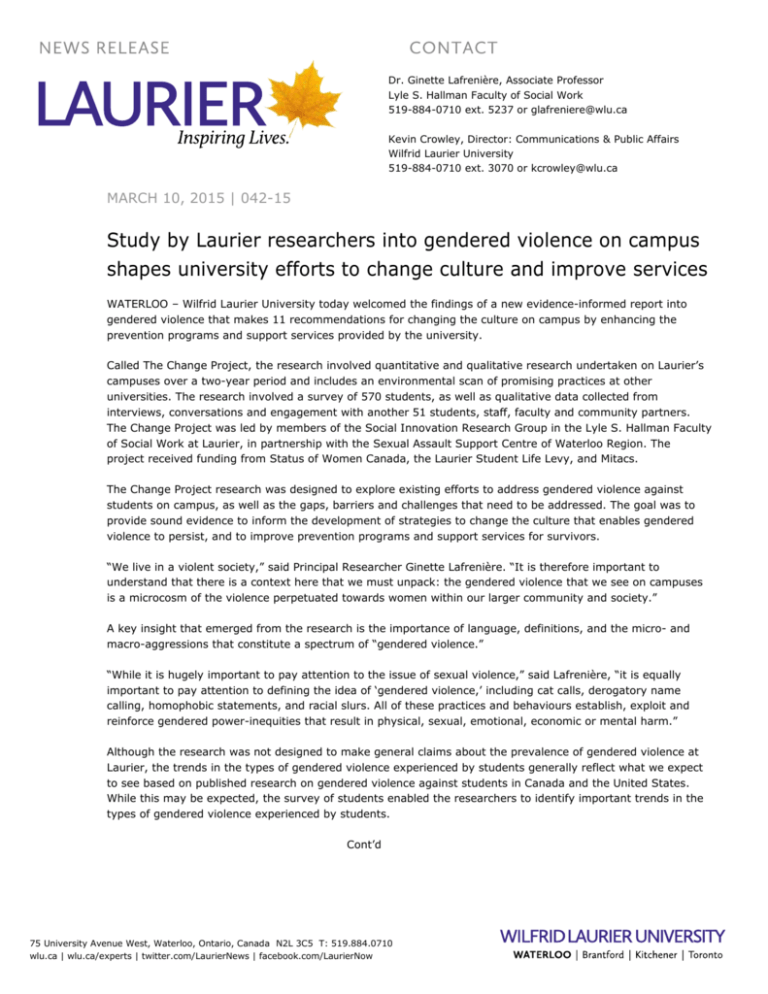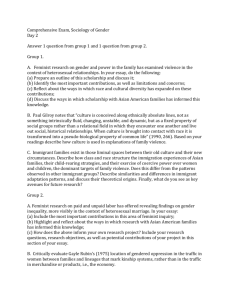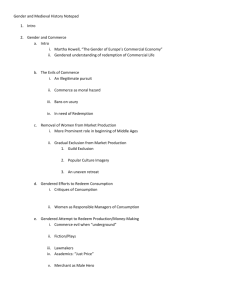
Dr. Ginette Lafrenière, Associate Professor
Lyle S. Hallman Faculty of Social Work
519-884-0710 ext. 5237 or glafreniere@wlu.ca
Kevin Crowley, Director: Communications & Public Affairs
Wilfrid Laurier University
519-884-0710 ext. 3070 or kcrowley@wlu.ca
MARCH 10, 2015 | 042-15
Study by Laurier researchers into gendered violence on campus
shapes university efforts to change culture and improve services
WATERLOO – Wilfrid Laurier University today welcomed the findings of a new evidence-informed report into
gendered violence that makes 11 recommendations for changing the culture on campus by enhancing the
prevention programs and support services provided by the university.
Called The Change Project, the research involved quantitative and qualitative research undertaken on Laurier’s
campuses over a two-year period and includes an environmental scan of promising practices at other
universities. The research involved a survey of 570 students, as well as qualitative data collected from
interviews, conversations and engagement with another 51 students, staff, faculty and community partners.
The Change Project was led by members of the Social Innovation Research Group in the Lyle S. Hallman Faculty
of Social Work at Laurier, in partnership with the Sexual Assault Support Centre of Waterloo Region. The
project received funding from Status of Women Canada, the Laurier Student Life Levy, and Mitacs.
The Change Project research was designed to explore existing efforts to address gendered violence against
students on campus, as well as the gaps, barriers and challenges that need to be addressed. The goal was to
provide sound evidence to inform the development of strategies to change the culture that enables gendered
violence to persist, and to improve prevention programs and support services for survivors.
“We live in a violent society,” said Principal Researcher Ginette Lafrenière. “It is therefore important to
understand that there is a context here that we must unpack: the gendered violence that we see on campuses
is a microcosm of the violence perpetuated towards women within our larger community and society.”
A key insight that emerged from the research is the importance of language, definitions, and the micro- and
macro-aggressions that constitute a spectrum of “gendered violence.”
“While it is hugely important to pay attention to the issue of sexual violence,” said Lafrenière, “it is equally
important to pay attention to defining the idea of ‘gendered violence,’ including cat calls, derogatory name
calling, homophobic statements, and racial slurs. All of these practices and behaviours establish, exploit and
reinforce gendered power-inequities that result in physical, sexual, emotional, economic or mental harm.”
Although the research was not designed to make general claims about the prevalence of gendered violence at
Laurier, the trends in the types of gendered violence experienced by students generally reflect what we expect
to see based on published research on gendered violence against students in Canada and the United States.
While this may be expected, the survey of students enabled the researchers to identify important trends in the
types of gendered violence experienced by students.
Cont’d
75 University Avenue West, Waterloo, Ontario, Canada N2L 3C5 T: 519.884.0710
wlu.ca | wlu.ca/experts | twitter.com/LaurierNews | facebook.com/LaurierNow
The Change Project/Page 2
“The qualitative methods corroborate the finding that gender discrimination and sexual harassment may be
some of the most frequent types of gendered violence that students experience,” said Project Coordinator Jay
Harrison. “Further, the gendered violence that students experience is fairly ubiquitous in that it happens
wherever students are gathering on campus, in the community and online.”
The Change Project report commends the Laurier community for its long-standing efforts to address issues of
safety, awareness and support involving gendered violence, and its past record of working with external
partners such as the Sexual Assault Support Center of Waterloo Region. But the report also identified areas that
need improvement and it makes a total of 11 recommendations grouped in four areas:
Prioritizing prevention
Action 1: Develop and implement a sustainable bystander intervention program.
Action 2: Focus on men and masculinity.
Action 3: Deliver broad-based and targeted education and awareness campaigns.
Coordinated, student-centred response
Action 4: Ensure policies follow promising practices and that all members of the university
community are familiar with them.
Action 5: Develop a sexual assault response protocol.
Action 6: Deliver training for likely first contacts.
Committed, accountable and transparent leadership
Action 7: Establish a standing committee to provide oversight on issues related to gendered violence against
students.
Action 8: Assign a new or existing role with the responsibility of coordinating on-campus efforts to address and
respond to issues related to gendered violence.
Action 9: Develop monitoring and evaluation systems.
Improved collaboration between the university and community.
Action 10: Develop a partnership with community-based service providers to deliver services to students on or
off campus (e.g. the Sexual Assault Support Centre of Waterloo Region).
Action 11: Develop education and awareness campaigns in partnership with the City of Waterloo and City of
Kitchener.
David McMurray, Laurier’s vice-president of Student Affairs and lead advocate for the university’s gendered
violence initiatives, welcomed The Change Report recommendations.
“As the report states, the Laurier community has been active for many years in addressing the spectrum of
issues associated with gendered violence,” said McMurray. “However, it also identifies areas where the
university needs to do better. The evidence-informed nature of The Change Project recommendations provides
excellent guidance for Laurier as we continue to move forward as an institutional leader in developing inclusive,
equitable and compassionate campus communities.”
McMurray said Laurier’s Gendered Violence Steering Group and associated Task Force of over 200 faculty, staff,
student, and community volunteers, is well positioned to build on The Change Project recommendations and on
existing Laurier programs and other proven best practices to shape a distinctive Laurier Gendered Violence
Action Plan going forward.
Cont’d
75 University Avenue West, Waterloo, Ontario, Canada N2L 3C5 T: 519.884.0710
wlu.ca | wlu.ca/experts | twitter.com/LaurierNews | facebook.com/LaurierNow
The Change Project/Page 3
“Gendered violence is a serious and systemic issue that impacts individuals, communities and society as a
whole,” said McMurray, who also serves as chair of the Council of Ontario Universities’ Reference Group
addressing issues of sexual violence. “Universities need to take a leadership role in education and prevention,
fostering a culture where gendered violence and its impacts are understood, survivors are supported, and those
who perpetrate gendered violence are held accountable. At Laurier, we are committed to nurturing a safe
learning and work environment where there is no tolerance for any form of gendered violence.”
Laurier’s Gendered Violence Action Plan is poised to include:
1. Leadership
- Presidential commitment to action.
- Student Union and Graduate Association support and engagement.
- Faculty Association, Staff Association, and Union representation support and engagement.
- Additional initiatives aimed at engaging all members of the Laurier community.
2. Communication
- Create a dedicated Gender Violence institutional webpage identified on the main website.
- Design social media #Change campaign identity and maximize communication opportunities.
- Engage in professional development presentations, conferences, webinars and workshops.
3. Policy, Protocol, and Practices
- Review existing policies, protocols and procedures to ensure best practices.
- Determine need and jurisdiction for a gender-violence policy that would encompass reporting options.
- Develop an effective, efficient, well-understood sexual assault response protocol.
- Determine the appropriate reporting balance between compliance and compassion.
4. Education, Training, and Prevention
- Institute education and prevention initiatives, and training for all students, administration, faculty, and staff.
- Deliver first-response and referral training for likely first-contacts.
- Prioritize prevention (e.g., bystander intervention, and men and masculinity focus).
- Recognize importance of peer-to-peer engagement and develop training opportunities for it.
5. Support and Services
- Clearly identify and communicate institutional and community resources and all supports on and off campus.
- Organize a survivor-engagement group, and safe space.
- Confirm an institutional documentation/accommodation procedure.
6. Community Partnerships
- Improve collaboration between Laurier and community-based service providers.
- Partner with the cities of Waterloo, Brantford and Kitchener to develop and deliver awareness campaigns.
- Build capacity through campus community relations.
Cont’d
75 University Avenue West, Waterloo, Ontario, Canada N2L 3C5 T: 519.884.0710
wlu.ca | wlu.ca/experts | twitter.com/LaurierNews | facebook.com/LaurierNow
The Change Project/Page 4
7. Assessment
- Collect evidence-based data to support decision-making and continuous improvement.
- Encourage continued research activity to inform best practices.
- Determine most appropriate reporting mechanisms, contacts, and documentation systems.
The Sexual Assault Support Centre of Waterloo Region, which secured the initial Change Project funding from
Status of Women Canada and partnered with the Laurier researchers throughout the initiative, was pleased with
the outcome of the research project and with the university’s response.
“The results of The Change Project come at a time when universities and colleges across the province are being
mandated to adopt campus-wide sexual violence and harassment policies,” said Sara Casselman, public
relations & operations manager at the Sexual Assault Support Centre of Waterloo Region. “In our experience,
Laurier is sincerely committed to a process that goes beyond compliance with new regulations. We are
committed to our partnership with the university and to ensuring support is accessible to students when they
reach out.”
The full Change Project report can be found at: http://www.sascwr.org/the-change-project
– 30 –
Contacts:
Dr. Ginette Lafrenière, Principal Researcher; Associate Professor, Faculty of Social Work, Wilfrid Laurier
University; Director Social Innovation Research Group.
519-884-1970 ext.5237 or glafreniere@wlu.ca
David McMurray, Vice-President: Student Affairs, Wilfrid Laurier University.
519-884-1970 ext. 3319 or dmcmurray@wlu.ca
Jay Harrison, Project Coordinator, Social Innovation Research Group, Wilfrid Laurier University.
519-884-0710 ext 5232 or jaharrison@wlu.ca
Sara Casselman, Public Relations & Operations Manager, Sexual Assault Support Centre of Waterloo Region.
519-571-0121 ext. 23 or sara@sascwr.org
Joan Tuchlinsky, Public Education Manager, Sexual Assault Support Centre of Waterloo Region.
519-571-0121 ext. 32 or joan@sascwr.org
Kevin Crowley, Director: Communications and Public Affairs, Wilfrid Laurier University.
519-884-1970 ext.3070 or kcrowley@wlu.ca
75 University Avenue West, Waterloo, Ontario, Canada N2L 3C5 T: 519.884.0710
wlu.ca | wlu.ca/experts | twitter.com/LaurierNews | facebook.com/LaurierNow










